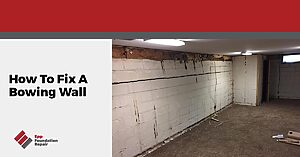Are you looking for information about the causes of cracks in walls? If so, don’t hit that back button! This short article will go over the five leading causes of cracks in walls, including when you need to worry about a crack and possible repair solutions for wall cracks.
Not All Cracks in Walls Are Structurally Significant
Even the most structurally sound homes may experience cracks in the walls over time. Some cracks are signs of a serious foundation issue, while others aren’t anything to worry about. But one thing’s for sure– cracks are unsightly and can detract from the value of your home. So what causes cracks in your walls, and how do you know when they need to be repaired?
The 5 Main Causes of Cracks in Walls
- Too much moisture – Water is the leading cause of all foundation problems. When water leaks into your home, it can cause structural materials to swell, rot, and weaken. This can cause a home’s walls to crack and crumble. Of course, moisture can also cause mold growth.
- Weather changes – When the temperature gets warmer, your home’s structural materials expand, and when the temperature drops, they shrink. Because of this movement, cracks may begin to form on your walls. However, small cracks caused by expansion and shrinkage are generally nothing to worry about.
- Settling – Settlement occurs when unstable soil causes the home above it to sink into the ground unevenly. This downward movement can cause cracks in walls, especially near the ceiling and above doorframes.
- Heavy objects – Hanging heavy objects from a wall may cause it to crack due to stress. Sometimes whatever’s hanging on the wall hides these cracks, and they aren’t discovered until the object is moved or falls off the wall.
- Poor drywall installation – The seams between drywall sheets must be properly taped, smoothed, and sealed during installation. If not, cracks in the drywall will likely form.
For more information, check our blog about – Gap between wall and floor.
Type of Cracks Likely with Foundation Damage: When You Need to Worry
Often, cracks in walls are nothing to worry about. However, if you notice any of these signs, you may be facing a more significant, structural issue:
- Horizontal wall cracks
- Doors and windows that don’t open and close properly
- Cracks that are wider than a 1/8 of an inch
- Cracks that are frequently forming and in large amounts
How to Fix a Crack in a Basement Wall
Most basement wall cracks are caused by hydrostatic pressure. Excess moisture in the soil outside the basement wall causes hydrostatic pressure to build up and push against the wall. If the pressure isn’t relieved via good drainage, the wall will eventually crack and even bow inward.
Repair solutions for a cracked basement wall include:
- C-Channel Wall Anchors
- Wall Plate Anchors
- Carbon Fiber Wall Straps
- Basement I-Beam Wall Support
- Helical Wall Anchors (Tiebacks)
- Epoxy Basement Wall Crack Repair
Have Suspicious Wall Cracks Inspected by a Professional
If you’re unsure about the severity of a crack, it’s best to have it checked out by a professional to be safe. Ignoring what may be a structural issue in your home will cause the problem to become much worse and much more expensive to fix.







